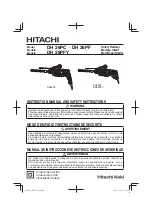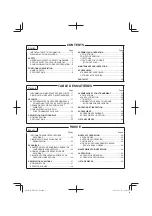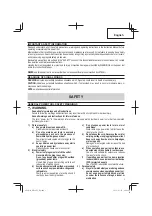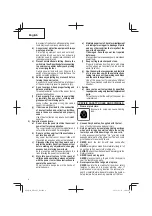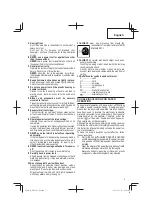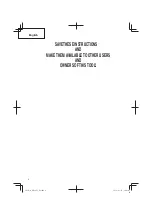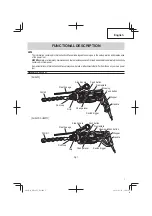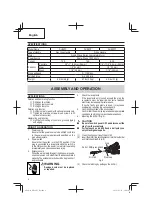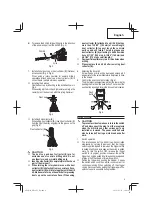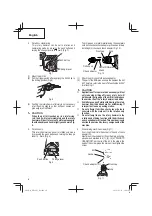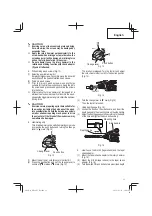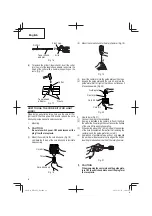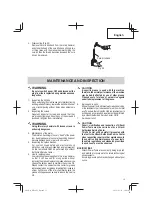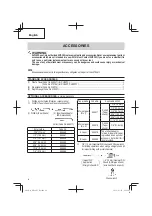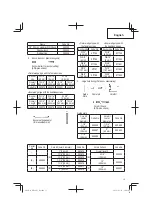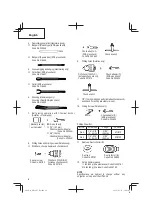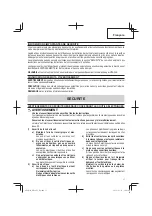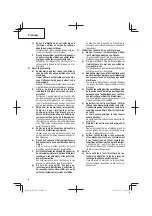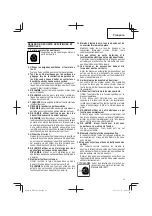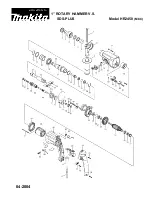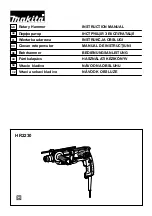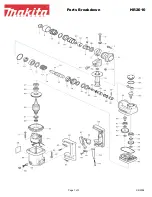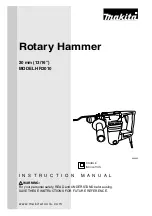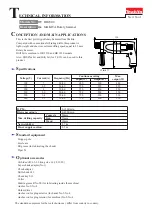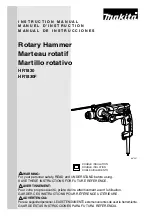
5
English
9. Use right tool.
Don’t force small tool or attachment to do the job of a
heavy-duty tool.
Don’t use tool for purpose not intended —for
example— don’t use circular saw for cutting tree limbs
or logs.
10. NEVER use a power tool for applications other
than those speci
fi
ed.
NEVER
use a power tool for applications other than
those speci
fi
ed in the Instruction Manual.
11. Handle tool correctly.
Operate the tool according to the instructions provided
herein. Do not drop or throw the tool.
NEVER
allow the tool to be operated by children,
individuals unfamiliar with its operation or unauthorized
personnel.
12. Keep all screws, bolts and covers tightly in place.
Keep all screws, bolts, and plates tightly mounted.
Check their condition periodically.
13. Do not use power tools if the plastic housing or
handle is cracked.
Cracks in the tool’s housing or handle can lead to
electric shock. Such tools should not be used until
repaired.
14.
Blades and accessories must be securely
mounted to the tool.
Prevent potential injuries to youself or others. Blades,
cutting implements and accessories which have been
mounted to the tool should be secure and tight.
15. Keep motor air vent clean.
The tool’s motor air vent must be kept clean so that
air can freely
fl
ow at all times. Check for dust build-up
frequently.
16. Operate power tools at the rated voltage.
Operate the power tool at voltages speci
fi
ed on its
nameplate.
If using the power tool at a higher voltage than the rated
voltage, it will result in abnormally fast motor revolution
and may damage the unit and the motor may burn out.
17. NEVER use a tool which is defective or operating
abnormally.
If the tool appears to be operating unusually, making
strange noises, or otherwise appears defective, stop
using it immediately and arrange for repairs by a
Hitachi authorized service center.
18. NEVER leave tool running unattended. Turn power
o
ff
.
Don’t leave tool until it comes to a complete stop.
19. Carefully handle power tools.
Should a power tool be dropped or struck against hard
materials inadvertently, it may be deformed, cracked,
or damaged.
20. Do not wipe plastic parts with solvent.
Solvents such as gasoline, thinner benzine, carbon
tetrachloride, and alcohol may damage and crack
plastic parts. Do not wipe them with such solvents.
Wipe plastic parts with a soft cloth lightly dampened
with soapy water and dry thoroughly.
21. ALWAYS
wear eye protection that meets the
requirement of the latest revision of ANSI
Standard Z87.1.
22. ALWAYS
be careful with buried object such as an
underground wiring.
Touching live wiring or electric cable with this tool may
result in electric shock.
Con
fi
rm before use whether hidden objects are
present, such as electric cables within the wall,
fl
oor or
ceiling.
23. De
fi
nitions for symbols used on this tool
V....................volts
Hz
.................hertz
A
...................amperes
n
o
..................no load speed
W
..................watt
..................Class II Construction
---/min ...........revolutions per minute
..................Alternating current
DOUBLE INSULATION FOR SAFER
OPERATION
To ensure safer operation of this power tool, HITACHI has
adopted a double insulation design. “Double insulation”
means that two physically separated insulation systems
have been used to insulate the electrically conductive
materials connected to the power supply from the outer
frame handled by the operator. Therefore, either the
symbol “ ” or the words “Double insulation” appear on
the power tool or on the nameplate.
Although this system has no external grounding, you must
still follow the normal electrical safety precautions given in
this Instruction Manual, including not using the power tool
in wet environments.
To keep the double insulation system e
ff
ective, follow
these precautions:
○
Only HITACHI AUTHORIZED SERVICE CENTER
should disassemble or assemble this power tool, and
only genuine HITACHI replacement parts should be
installed.
○
Clean the exterior of the power tool only with a soft cloth
moistened with soapy water, and dry thoroughly.
Never use solvents, gasoline or thinners on plastic
components; otherwise the plastic may dissolve.
000Book̲DH26PC̲NA.indb 5
000Book̲DH26PC̲NA.indb 5
2016/01/25 14:08:42
2016/01/25 14:08:42

